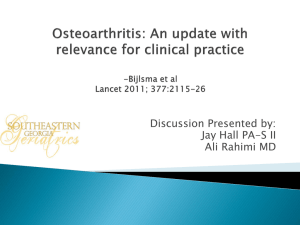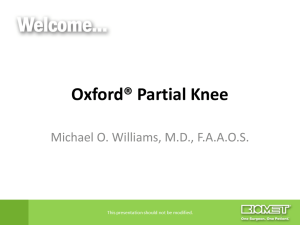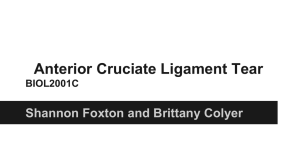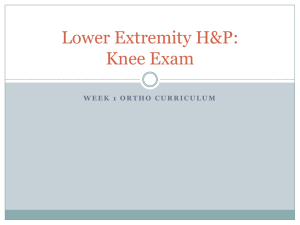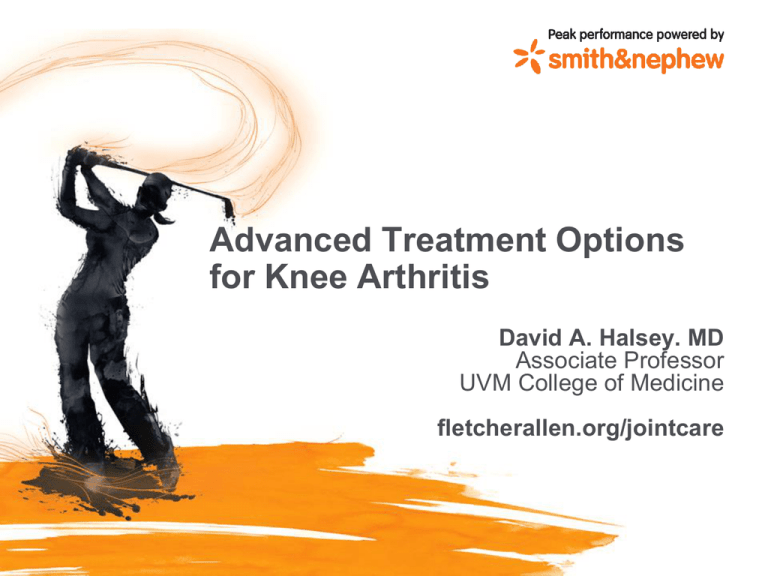
Advanced Treatment Options
for Knee Arthritis
David A. Halsey. MD
Associate Professor
UVM College of Medicine
fletcherallen.org/jointcare
What is Osteoarthritis or OA?
Pelvis
•
The most common form of
arthritis and often called the
“wear and tear” arthritis.
•
Joint lining becomes pitted,
eroded, uneven…and painful.
•
Bone spurs, or osteophytes, often
form around the joint.
•
The common activities of daily
living become limited by extreme
pain.
•
Most of the people who have
osteoarthritis are older than age
45, and women are more
commonly affected than men.
Bone spurs
Damaged
Cartilage
Femur
Arthritic
Hip
Arthritic
Knee
Osteoarthritis Symptoms
•
The main symptom of
osteoarthritis is PAIN.
•
You may feel pain during
movement and even at rest.
•
Your joints may also be stiff and
swollen, and you may even
experience a loss of range of
movement in the joint.
•
The symptoms of osteoarthritis
may interfere with your normal
activities, such as walking and
dressing, and they may also
disrupt your sleep.
Osteoarthritis Causes
Excessive wear on the joints
Joint injuries from sports and other high-impact activity
Age, although osteoarthritis does not occur in all people as they age
Obesity, especially with osteoarthritis of the knees
A small deformity of the bones in a joint
Work-related activities or accidents
Knee Anatomy
•
The lower femur and upper tibia
are covered in cartilage
•
LCL/MCL ligaments provide
stability
•
The patella tracks through the
trochlear groove, aligning the
quadricep muscle during flexion
and extension
Femur
Ligaments
Patella
Tibia
™Trademark of Smith & Nephew.
Knee Anatomy
• Hinge joint
• Two menisci - cushion pads
– Stabilize
– Distribute body weight
• ACL/PCL – ligaments that
stabilize knee from front to
back
©2006 Smith & Nephew, Inc.
All rights reserved.
PCL
ACL
Meniscus
Disease Progression
In the beginning stages of osteoarthritis, you
may have no symptoms, but signs of the
disease may be seen on an x-ray.
According to the Arthritis Foundation, most
people over age 60 show signs of
osteoarthritis on an x-ray, but only about one
third of them have symptoms.
Disease Progression
The surface of the smooth
cartilage covering the joint
softens.
The cartilage begins to lose
its ability to absorb the
impact of movement and is
now more easily damaged
from excess use or injury.
Disease Progression
Large sections of cartilage may
wear away completely with time.
The joint may lose its normal shape
as the cartilage breaks down.
Disease Progression
Bony growths or spurs called
osteophytes may form on the edges of
bones in the joint.
Open cysts may form in the bone near
the joint, and bits of bone or cartilage
may float around in the joint space.
Non-surgical alternatives
Non-surgical alternatives
•
Lifestyle modification
•
Weight Control
•
Exercise and physical therapy
•
Anti-inflammatory medication
•
Steroid Injection
•
Joint fluid therapy (hyaluronic
acid)
™Trademark of Smith & Nephew.
Exercise & Weight Control
•
Research shows that
exercise is one of the best
treatments for osteoarthritis.
•
Exercise decreases pain,
improves flexibility and helps
maintain weight.
•
A healthy diet can facilitate
weight loss resulting in
reduced stress on weightbearing joints and limiting
further injury.
Medication
•
Heat and Cold are non-drug ways that may relieve
pain.
–
•
Medicines commonly used in treating OA include:
–
•
warm bath/hot packs or cold packs
acetaminophen
–
NSAIDs (nonsteroidal anti-inflammatory drugs)
–
topical pain-relieving creams and sprays
–
narcotic painkillers
–
corticosteroids
–
hyaluronic acid
Many medicines used to treat OA have side effects,
so it is important for patients to learn about the
medicines they take.
Joint Fluid Therapy
•
•
•
•
Joint Fluid Therapy is a treatment
to help treat the pain of
osteoarthritis of the knee.
It provides long-lasting relief from
arthritis pain for many patients.
Joint Fluid Therapy involves
injecting a substance called
hyaluronic acid into the knee.
This substance is similar to the
fluid that occurs naturally in the
knee – synovial fluid – which
helps to lubricate the knee,
reducing friction and protecting
from pain.
Surgical Solutions
Uni-Compartmental Knee Replacement
UNI-compartmental osteoarthritis (OA)
•
Studies show up to 20% of
patients may have osteoarthritis
in only one of the three knee
compartments
•
Osteoarthritis is most commonly
found in the middle and inside
compartments of the knee
•
Bone preservation is important for
younger, active patients
•
Ligament preservation may be
even more important for natural
feeling during physical activity
JOURNEY* UNI Knee Replacement
Knee revision pathway
JOURNEY* UNI
knee implant
Total knee implant
Revision knee implant
JOURNEY* UNI Knee
Patient Benefits
•
Preserves the healthy bone and
cartilage in the outside and middle
compartments of your knee
•
Preserves your anterior cruciate
ligament (ACL) and posterior cruciate
ligament (PCL) – key to the stability
and natural motion in your stride
•
Smaller incision means reduced postop pain
•
Faster return to physical activity
•
Future capability to receive a standard
primary knee rather than a more
invasive revision component
JOURNEY UNI System
The Bottom Line
–
Only the diseased portion of your joint is replaced
–
And you keep your ACL and PCL
Bi-Compartmental Knee Replacement
Bi-compartmental osteoarthritis (OA)
•
Studies show up to 70% of
patients may have osteoarthritis
in only two of the three knee
compartments
•
Most commonly in the middle and
inside compartments
•
Bone preservation is important for
younger, active patients
•
Ligament preservation may be
even more important for natural
feeling during physical activity
JOURNEY DEUCE replacement
Degenerative knee
Bone Cuts
Implant components
Implanted
JOURNEY DEUCE system
Patient Benefits
•
•
•
•
•
Preserves the healthy bone and
cartilage in the outside
compartment of your knee
Preserves your anterior cruciate
ligament (ACL) and posterior
cruciate ligament (PCL) – key to
the stability and natural motion in
your stride
Smaller incision means reduced
post-op pain
Faster return to physical activity
“Revises” to a standard primary
knee rather than a more invasive
revision component
JOURNEY DEUCE system
The Bottom Line
Only the diseased portion
of your joint is replaced!
And you keep your ACL
and PCL!
Patellofemoral Joint Replacement
The JOURNEY™ PFJ™
Degenerative knee
™Trademark of Smith & Nephew.
Bone Cuts
PFJ component
Implanted
The JOURNEY PFJ
Patient Benefits
•
•
•
•
•
•
Preserves the healthy bone and
cartilage in two of the three
compartments of your knee
Preserves your anterior cruciate
ligament (ACL) and posterior
cruciate ligament (PCL)
Preserves all bone and cartilage
on your tibia
Reduced post-op pain medication
Faster return to physical activity
“Revises” to a standard primary
knee rather than a more invasive
revision component
™Trademark of Smith & Nephew.
The JOURNEY PFJ
The Bottom Line
–
Only the diseased portion of your joint is replaced
–
And you keep your ACL and PCL
Total Knee Replacement
Total knee replacement
Degenerative knee
Cuts
Implant components
Implanted
The JOURNEY Knee
•
Designed to recreate the natural
motion and feel
of your original knee
•
Sized appropriately
for men and women
•
Anatomic shapes and functions
are recreated
•
Made from advanced
material that may extend
the life of the implant
™Trademark of Smith & Nephew.
Total Knee Replacement
• With your total knee
replacement surgery, the
damaged parts of your knee
that need repair will be
removed and replaced with
metal and plastic implants.
• During surgery, an implant,
especially selected to match
your needs, will be affixed to
the underlying bones.
Total Knee Replacement
• The damaged portions of the femur
and cartilage are cut away. The end
of the femur is reshaped to allow the
metal femoral component to fit onto
it.
Total Knee Replacement
• The metal
component is
attached to the end
of the femur using
bone cement.
Total Knee Replacement
• The damaged area of the tibia
and cartilage are cut away. The
tibia is reshaped to receive the
metal tibial component.
Total Knee Replacement
• The metal baseplate is
cemented in place and the
plastic insert is snapped in to
the baseplate.
Longevity of the implant
OXINIUM™ Oxidized Zirconium
•
Zirconium – a biocompatible metal
similar to titanium
•
The outer surface takes on lowfriction ceramic qualities during
patented process
•
Surface becomes 4,900-times more
resistant to the commonly
experienced metal abrasion that
wears through plastic components
•
The oxidized surface reduces plastic
component wear by up to 85% when
compared to cobalt chrome.
™Trademark of Smith & Nephew. Certain marks Reg. US Pat. & TM Off.
Traditional
OXINIUM material
implant material
Longevity of the implant
OXINIUM™ Oxidized Zirconium
•
May extend the life of the
implant due to wear
•
Weighs 20% lighter than samesized implant made from cobalt
chrome
•
Safe for patients with metal
allergy
•
Appropriate for physically active
adults
™Trademark of Smith & Nephew. Certain marks Reg. US Pat. & TM Off.
VERILAST™ Knee
Technology
For Knee Replacement
Implants
™
Trademark of Smith & Nephew.
Traditional Material vs. VERILAST™
Technology
Traditional Material
•
Typically combines cobalt chrome
with high-density plastic
•
Expected to last 10-15 years
before wear becomes an issue
VERILAST
•
Combination of Smith &
Nephew’s patented OXINIUM™
metal alloy and “highly crosslinked” polyethylene
•
A knee implant technology that
combines two low-friction
materials
™Trademark of Smith & Nephew. Certain marks Reg. US Pat. & TM Off.
OXINIUM
Cross Linked Poly
VERILAST™ Wear Study
•
Smith & Nephew LEGION™ Cruciate Retaining Knee with
VERILAST Technology was subjected to extensive lab
testing and it surpassed expectations:
•
After 5 million simulated steps, wear was reduced by
98% compared to implants made from traditional
materials.
•
After 45 million steps, wear was reduced by 81% when
compared to traditional material implants at 5 million
steps
•
45 million steps = 30 years of typical use under
normal conditions
™Trademark of Smith & Nephew. Certain marks Reg. US Pat. & TM Off.
About VERILAST™ Knee Technology
Based on laboratory wear simulation testing, the LEGION
Primary Knee System with VERILAST technology is expected
to provide wear performance sufficient for 30 years of actual
use under typical conditions.
•Results of wear simulation testing have not been proven to predict
actual joint durability and performance in people
•Reduction in wear alone may not result in improved joint durability
and performance
•Other factors such as bone structure, can affect joint durability and
performance and cause medical conditions resulting in additional
surgery
•These other factors were not studied
About Knee Replacement Surgery Patient
Information
•
There are potential risks with knee replacement surgery such as
loosening, fracture, dislocation, wear and infection may result in
additional surgery
•
Do not perform high impact activities such as running and jumping
unless your surgeon tells you these activities are acceptable
•
Early device failure, breakage or loosening may occur if you do not
follow your surgeon’s limitations on activity level
•
Early failure can happen if you do not guard your knee joint from
overloading due to activity level, failure to control body weight or
accidents such as falls
•
Knee replacement surgery is intended to relieve knee pain and
improve knee functions
•
Talk to your doctor to determine what treatment may be best for you
•
Additional information available at www.RediscoverYourGo.com
Why choose VERILAST™ Knee
Technology?
Visionaire
Technology
™
Trademark of Smith & Nephew.
Background
•
Patient-specific alignment may
result in better surgical outcomes
for patients
6°
mechanical axis perpendicular
™
Trademark of Smith & Nephew.
AP axis
Over 30% of total knee
replacement failures are due to
misalignment during surgery
mechanical axis
•
3
°
epicondylar axis
What is Patient Matched Technology?
•
VISIONAIRE™
Patient Matched
Technology utilizes your own XRay and MRI to design surgical
instrumentation that is unique to
you
•
Custom cutting blocks and guides
are produced to match the exact
shapes and angles of your
anatomy
•
This provides a custom-fit, more
accurately aligned knee implant
™
Trademark of Smith & Nephew.
Why is it special?
•
May eliminate time in the operating
room, which reduces time under
anesthesia and the risk of infection
•
Precise alignment may result in a
longer lasting implant
•
May lower risk of complications
from surgery, such as Deep Vein
Thrombosis (DVT)
™
Trademark of Smith & Nephew.
Mini-Incision Surgery
• Uses the same clinically
proven implants of
traditional knee
replacement surgery
• The surgical instruments
have been reduced in size.
Mini-Incision Surgery
What does this mean?
• Reduces incision length
and scar to 3.5 to 4
inches.
• Does not “evert” the
patella or cut the quad
tendon
• Less post-operative pain
• Speeds rehabilitation time
and returns you to your life
more quickly.
Total Replacement
After surgery
• The patient is sent to recovery
• Physical therapy begins day 1
post-op
• Discharge from the hospital in
3-5 days
• Follow-up with the surgeon at
1, 3, 6 and 12 month
intervals.
Thank you
Surgeon Name
Clinic Name
Clinic Address
Clinic Address
Phone Number
Web Address


